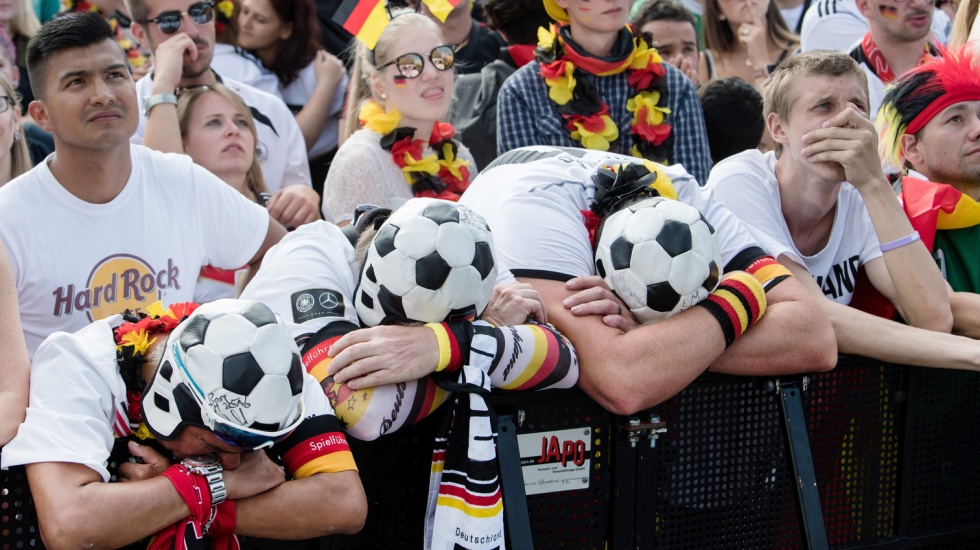Germany’s Unexpected World Cup Exit, What Went Wrong
The 2018 World Cup in Russia is surely one of the most memorable moments in FIFA history as the reigning champion, Germany, had been kicked out of the group stage by an unsuspecting underdog, the South Koreans.
Well, this might also be the defining image of the World Cup in Russia.
Joachim Low was too confident to believe that everything’s going to be fine once they face the hopeful Koreans. Unfortunately, his expectations didn’t quite sync well with the reality of things. Gone are the days when only the giants dominate the football world.
Now, the World Cup is anyone’s game. As they say, the game of football is like a ball. Anything can happen.
The 58-year-old German can’t help but relieve their glory days four years ago. Kicking Brazil out of the quarter final, and defeating Argentina 1-0 in the final was the epitome of his success. But then again, nothing stays the same because the odds turned against them.
Believing that his current squad can crush any opposition along the way was a biased and misguided fact.
Low knew that he had a huge part in Germany's disappointing campaign. In an interview, Low said that they took thing too easy because after, all they're the reigning champions. It turned out that their over-confidence served them right — group elimination.
He even said that they entered the tournament with an off-duty mood, implying that they looked at Russia as a travel destination, and not as a staging ground for football greatness.
It was the country’s worst World Cup run since 1938. Everyone was out of sync. Even big-name players like Mesut Ozil, Tony Kroos, and Manuel Neuer failed to do what they were supposed to do. It was like everyone was leaving their roles.
It was a sloppy German game, so to speak. In an interview, Low stated that they grew arrogant with the thought that they defied the odds in Rio. He continued saying that they thought that they had solved their weaknesses in the friendlies.
The German squad was defeated by the Brazilians in what many called as Brazil's vengeance game. It was a 0-1 victory for Brazil. Then came there friendlies with Austria, one of the biggest underdogs.
They were then again defeated 2-1 — another huge disgrace for the 2014 champs. Good thing they've made up a bit for their lapses as they won 2-1 against Sweden. Nonetheless, these were the friendlies, and they didn't count.
But one thing was confirmed during those games, and that the current German squad isn’t fully equipped with the resources needed to dominate in Russia.
These were clear warnings that something was wrong in their lineup, or perhaps the kind of training that the confident Low implemented on them.
Despite these signs, Low hastily dished out these so-called forecasts as meaningless as he assures the public that Germany will be back at its best form once the World Cup starts. Well, that’s not what happened as Mexico defeated them 1-0.
They might have managed to bounce back with their 2-1 victory over the Swedes, but their succeeding game proved fatal.
Their tempo was clearly lacking, and the midfield was filled with huge gaps which opened up lots of space for the South Koreans to break into their lines. It was a very lopsided and out of sync gameplay.
Critics are even frank to criticize them as lacking cohesion and energy, probably because they knew their enemy was at the back-end of the rankings. This is common in the football world as strong teams tend to reserve their energy on more challenging games.
In this case, however, they thought that they could just bring out a bit of their skills because they can manage the underdogs easily. Look what happened afterward — the supposedly strongest team got eliminated.
Die Mannschaft defender Mats Hummels said in an interview after the game that their last good game was way back in the autumn of 2017, which is, by all means, a long time.
He also added that they didn’t do anything to solve their game issues during their three friendlies games. However, the highlight of his statement was when he said that the coach is to blame for their loss, and not the players.
This makes a bit of sense, though, even if everyone knows that the players too had a big role in their elimination. What happened during their games was that Low decided to let the experienced players play even if they had already seen how effective their young squad was.
Take note that they've dominated the Confederations Cup with the help of their youngsters. If only Low chose to let the younger and agiler players, instead of the older and more experienced ones, then their campaign might have turned out differently.
Also, Low chose to carry on with a gameplay strategy that was expected by the Mexicans and the South Koreans. These are small errors that they should have solved in the first place. It wouldn’t take a genius to figure out where they went wrong.
But still, the team, specifically Low, decided not to mind these issues. The result? Players getting out of sync and losing enthusiasm to push their campaign further.
What made their games even worse was when Low decided to bench Mesut Ozil and Sami Khedira.
The Germans might have a number of half chances and shots without these superstars, but their lack of cohesiveness still overshadowed these strengths. Germany had also played with less energy and teamwork since Low decided to change things up in the squad.
Even the half-time substitutions weren't well thought of as it caused an imbalance in the team.
Low’s half-baked lineups proved to be a misfit for the supposedly agile German squad. The team’s tempo should be controlled, but what happened instead was that they exhausted everything at the start of the game.
Pacing is crucial. Unfortunately, they didn't have any. Or if they did have, it's only in a minuscule amount.
Another important thing to take note is Leroy Sane’s exclusion. If only he were used more often, then there would be no doubt that the game would have turned out differently. Then again, it's all about choosing the right players.
It just happened that Low finds Sane’s game to be very fast and direct. And if this was the case, then there’s no denying that Low’s system is by all means, slow.
The defeat at the hands of the underdogs is a huge loss on their side, as they never thought that it would happen. But then again, the unthinkable happened, and along with it had their confidence go away.
They found the matchup to be a total mismatch, but unknown to them, Shin Tae-yong had already figured out their every move. Ozil was the driving force of their core, while Thomas Muller and Marco Reus are expected to be in tandem with Mario Gomez' attacking skills.
It doesn’t need a genius to figure out how the Germans’ game will turn out. Even Mats Hummels’ game was too predictable to make a statement against the ingenious South Koreans. It’s because of these factors that the Germans got eliminated early in the competition.
Even the stadium had a big role to play in the outcome of the game. Playing in the Kazan arena was a game changer for them because of the different surroundings and the overwhelming Russians who support the Koreans.
But then again, it’s not a fully negative story for the Germans because their fundamentals are still well intact. Their players are still of good quality and are expected to be trophy contenders in the next years to come.
However, that doesn’t mean that Low will be in charge with Die Mannschaft as he had a huge hand in Die Mannschaft’s failed World Cup campaign.
For sure, the German FA would want Low to continue managing the teams because, in the first place, there's no other person who can replace him. Low is, by all means, a great manager. He also has a proven track record of being a genius in the game.
Unfortunately, his recent big-time disappointment in Moscow turned all of his achievements into useless history records. And because of this, it’s expected that he would turn down any offer of him managing the German squad again.
After all, he knows that he’s one of the biggest factors as to why an underdog team such as South Korea annihilated them 2-0.
Low would be remembered not as a World Cup-winning coach, but as someone who brought the biggest triumph and failure for Germany. His legacy now hangs in the balance, and it’s up to him on how he’s going to fare in the off season.
Solving and creating new problems
Low knew how this year's World Cup would turn out. The tropical heal in Kazan would force a different kind of gameplay, which would affect the performance of the players involved. So what he did was he introduced a new approach, somewhat kind of a more fluid approach.
First off, he focused on doing better ball circulation. This would open spaces for counter-presses, which would help recycle balls before counterattacks take place. He also made sure that the front and back four spaces were protected from all angles.
It sounds good, but that just messed up their already solid attacking lines.
Low brought back Ozil to replace Julian Draxler. Ozil had a great time manning the line positions in Arsenal. In simpler words, he was strong defensively. He’s also got a good connection with Timo Werner and Marco Reus, who are both spectacular ball handlers.
The change makes sense. However, Leon Goretzka was still added to the right. It was originally Thomas Muller’s place, but now he had to support the right back together with Joshua Kimmich. It turned out that Toni Kroos was a bit hesitant to hold the midfielder because of his natural inclination to go for more aggressive lines.
Niklas Sule also replaced Jerome Boateng after being suspended. This was a huge offset as it decreased the team’s fluidity.
This was worsened when Khedira’s lack of pace and passing skills was felt by the holders. It seemed like he was always confused as to whether he should hit the runners or continue handling the ball to exhaust the South Koreans. It was an unneeded dilemma because it cost the team their fluidity.
Take for example what happened when Goretzka got the ball deep within enemy lines. It was when he ran down through the channel solo until he was cornered by a redshirt. Indeed, Low haven't covered these in his list of expected situations.
Opposition box failure
Germany had the chance to make up for their failed goal attempt in the first half after the break. It can be felt that the South Koreans had a harder time upping their tempo as compared to the first half.
The Germans’ chances even went higher when Goretzka successfully headed and skewed a volley from Werner.
Unfortunately, he was unable to continue his remarkable spell as he failed to lead the line early on. Then again, the lack of focus and fiery determination is another reason why this happened.
Mario Gomez' presence in the right-wing also made the RB Leipzig forward confident that everything will be fine.
Getting the striker from VfB Stuttgart is a hint of a disastrous outcome. The system that Low implemented in the team wouldn’t just work because of the lack of camaraderie between the players, as well as their natural roles. Low’s starting 11 was a solid mismatch.
The wonder strike from Kroos was supposed to be the determining factor of the game. But just like what happened earlier, it was intercepted by the fiery South Koreans. The Germans were unable to produce open plays throughout the game.
This should have been the case knowing that Low confirmed that they had heavily trained on their triangles and approach plays. It turned out that the supposed training sessions weren’t applied in the game.
Low's chance of continuing as manager is in doubt knowing how he failed in the recent World Cup. Even the injury time goals from South Korea, which shouldn't have been a big problem for the reigning champs, inflicted a major blow on their offense.
Indeed, there’s no denying that Germany’s performance was blunt and confusing throughout their entire campaign. For sure, the players had a hand in this, but the players are merely the followers of the manager.
In this case, it's Low who's instructing them to change their gameplay, which, unfortunately, led to their demise.
But if he decided otherwise, then his reign on Die Mannschaft would come to an end.
Gauging Joachim Low's coaching career
However, things are a bit different in Low’s case knowing how valuable he is in Germany. He’s got the freedom to decide whether he wants to make up for his disappointing World Cup run, or will he get on a new path.
As of now, there is still no conclusive evidence as to what he'll do. But based on the looks of it, the German FA will make sure that he's still on their radar.
Based on what the German FA has to say regarding Joachim Low’s career, it can be assumed that he’ll continue his job as coach. The reason behind this is that the association knew how much Low had contributed to Germany’s success in the previous World Cup.
Yes, he might have a series of pitfalls this year, but that's acceptable for the guys at the German FA. The main cause of their failed campaign was because of over-confidence. That's the simplified issue they had and should work on next time.
It also doesn’t need a genius to figure out how to solve that problem because it’s fairly easy. What’s more is that Low can surely find a solution to fixing that over-confidence issue they had in Russia.



